
Mathematics and Financial Economics
metrics 2024
Innovating Financial Strategies through Mathematical Rigor
Introduction
Mathematics and Financial Economics, published by Springer Heidelberg, is a leading peer-reviewed journal that explores the intersections of mathematical theories and financial practices. With an ISSN of 1862-9679 and an E-ISSN of 1862-9660, the journal has made notable contributions to its field since its inception in 2007, with a convergence period extending until 2024. Positioned in the prestigious Q2 category for both Finance and Statistics and Probability, the journal is ranked within the top 66th percentile in Mathematics and Statistics and the 62nd percentile in Decision Sciences according to Scopus metrics. Researchers and professionals looking for high-quality, innovative research in mathematical finance will find valuable insights within its pages. Although primarily a subscription-based journal, it aims to foster knowledge sharing among academia and industry experts. Its commitment to advancing quantitative methods and financial applications solidifies its importance as a resource for students, researchers, and practitioners dedicated to understanding and navigating the complex dynamics of financial markets.
Metrics 2024
 0.73
0.73 0.90
0.90 1.20
1.20 29
29Metrics History
Rank 2024
Scopus
IF (Web Of Science)
JCI (Web Of Science)
Quartile History
Similar Journals

Computational Economics
Bridging Theory and Technology for Economic Progress.Computational Economics is a premier journal dedicated to advancing the interdisciplinary field that bridges computational methods and economic theory. Published by Springer in the Netherlands, this journal serves as a critical platform for researchers and practitioners from economics, econometrics, and computer science, fostering innovation and cross-pollination of ideas from 1993 to 2024. With a notable impact factor in its categories—ranking Q2 in Economics, Econometrics, and Finance and Q3 in Computer Science Applications—Computational Economics consistently delivers rigorous peer-reviewed research that addresses contemporary challenges in economic modeling and computational techniques, making it an indispensable resource for the academic community. The journal provides a range of access options and is indexed in Scopus, where it holds a strong position in the 78th percentile of its category, ensuring high visibility and engagement for published works. Researchers, students, and professionals will find valuable insights across its diverse scope, facilitating the exploration of new methodologies that shape the future of economic analysis.
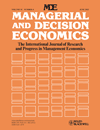
MANAGERIAL AND DECISION ECONOMICS
Advancing Managerial Insights Through Empirical ResearchMANAGERIAL AND DECISION ECONOMICS is a highly regarded academic journal published by John Wiley & Sons Ltd that serves as a vital resource in the field of business and management. With an ISSN of 0143-6570 and an E-ISSN of 1099-1468, this journal has established itself as a prominent platform for disseminating cutting-edge research from its inception in 1980 through to 2024. Currently ranked in the Q2 category across multiple fields—including Business and International Management, Management of Technology and Innovation, Management Science and Operations Research, and Strategy and Management—it highlights significant contributions within these domains. The journal is based in the United Kingdom and contributes to the ongoing dialogue and development of innovative managerial practices driven by empirical decision-making research. Although the journal does not offer open access, it remains highly influential, with noteworthy Scopus rankings showing its strong impact within the scholarly community. Researchers, professionals, and students alike will find valuable insights and advancements in management science that inform and enrich their practices and academic pursuits.
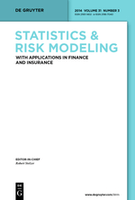
Statistics & Risk Modeling
Navigating the complexities of uncertainty with precision.Statistics & Risk Modeling is a distinguished journal published by WALTER DE GRUYTER GMBH, focusing on the intricate relationships between statistical methodologies and risk assessment techniques. With a strong academic foundation, the journal has been an influential platform in its field since its inception, converging contributions from 1982 to 2002 and again from 2011 to 2024. This journal is currently ranked in the Q3 category in both Modeling and Simulation and Statistics and Probability, reflecting its commitment to advancing knowledge and promoting robust research in statistics, probability, and uncertainty analysis. Although it offers a traditional subscription model, its significant contribution to the community is underscored by its increasing visibility in Scopus rankings, where it stands in the 44th percentile for Decision Sciences and Statistics. By comprehensively addressing contemporary issues in statistical theory and its practical applications, Statistics & Risk Modeling serves as an essential resource for researchers, professionals, and students aiming to deepen their understanding of statistical science and its implications in risk management.
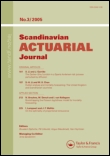
Scandinavian Actuarial Journal
Connecting tradition and innovation in statistical methodologies.The Scandinavian Actuarial Journal, published by Taylor & Francis Ltd, stands as a pivotal resource in the fields of Economics, Econometrics, Statistics, and Probability, with a legacy dating back to 1918. This esteemed journal, headquartered in the United Kingdom, offers valuable insights and comprehensive research findings that contribute significantly to the actuarial and statistical communities. With its impressive 2023 quartile rankings—Q1 in both Statistics and Probability, and in Statistics, Probability and Uncertainty, as well as Q2 in Economics and Econometrics—this journal is recognized for its high-quality peer-reviewed content, making it indispensable for researchers, professionals, and students alike. Although it currently does not operate under an Open Access model, the journal ensures rigorous academic standards and broad visibility within its field. With a Scopus rank placing it in the top quartile of relevant categories, the Scandinavian Actuarial Journal is committed to advancing knowledge and fostering innovation in statistical methodologies and insights.
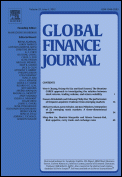
Global Finance Journal
Pioneering research for a global financial future.Global Finance Journal is an esteemed periodical published by Elsevier, dedicated to the dynamic fields of finance and economics. With an impressive history spanning from 1989 to 2024, this journal holds a significant position in the academic community, boasting a Q1 quartile ranking in both Economics and Econometrics, as well as Finance, as of 2023. It is highly regarded in Scopus rankings, placing 40th out of 317 in Finance and 99th out of 716 in Economics and Econometrics, demonstrating its influence and reach among researchers and practitioners alike. Although not an open-access journal, the Global Finance Journal provides rigorous peer-reviewed articles that explore critical issues, advance theoretical frameworks, and address practical applications in global finance. As such, it serves as a vital resource for researchers, financial professionals, and students aiming to deepen their understanding of economic phenomena and contribute to the ongoing discourse in these vibrant disciplines.
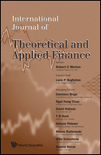
International Journal of Theoretical and Applied Finance
Elevating financial knowledge with rigorous scholarship.International Journal of Theoretical and Applied Finance is a distinguished publication in the field of finance, serving as a critical platform for the dissemination of innovative research and theoretical insights since its inception in 2003. Published by World Scientific Publishing Co Pte Ltd in Singapore, this journal boasts an impressive Q2 ranking in the realms of Economics, Econometrics, and Finance (miscellaneous) and a solid Q3 status in Finance for 2023. With a commitment to advancing knowledge in the complex world of theoretical frameworks and applied financial practices, it welcomes original research articles, comprehensive reviews, and case studies that explore varied facets of finance. Researchers, professionals, and students benefit from the journal's rigorous peer-review process and an ever-expanding repository of knowledge, making it an indispensable resource in the financial academic community. The journal does not currently offer open access, reflecting its selective approach to publishing high-quality content aimed at a specialized audience.

Quantitative Finance and Economics
Empowering Insights Through Quantitative AnalysisQuantitative Finance and Economics, published by the American Institute of Mathematical Sciences (AIMS), is a pioneering open-access journal committed to advancing the fields of finance and economics. Established to disseminate high-quality research, this journal has been an open-access platform since 2017, promoting wider accessibility to vital academic findings. It serves as a crucial resource for researchers and professionals alike, offering valuable insights through rigorous studies in quantitative methods that influence financial and economic decision-making. Although current Scopus rankings indicate emerging challenges, with a rank in the lower percentiles across various categories, Quantitative Finance and Economics strives to gain recognition by bridging theoretical frameworks with practical applications. The journal invites contributions that explore innovative quantitative techniques and their implications in contemporary economic scenarios, thus underscoring its role in shaping discourse and research in this critical sector.

Journal of Investment Management
Empowering Investment Decisions Through Rigorous Research.The Journal of Investment Management, with ISSN 1545-9144 and E-ISSN 1545-9152, is a prominent platform dedicated to the dissemination of cutting-edge research in the field of investment management. Published by JOURNAL INVESTMENT MANAGEMENT, this journal aims to bridge the gap between theoretical foundations and practical applications, catering to the needs of researchers, professionals, and students alike. With a focus on contemporary issues influencing investment strategies, asset allocation, risk management, and financial innovation, this journal provides valuable insights and methodologies to enhance investment decision-making processes. While currently not operating under an open-access model, the journal is accessible through various academic databases, ensuring that its critical findings reach a wide audience across the globe. Emphasizing the significance of empirical research and analytical rigor, the Journal of Investment Management plays a crucial role in shaping the future of investment practices and academic discourse in this dynamic field.

JOURNAL OF FINANCIAL ECONOMICS
Navigating the complexities of finance and economics with clarity.Welcome to the JOURNAL OF FINANCIAL ECONOMICS, a premier publication in the realms of finance, economics, and accounting, published by Elsevier Science SA in the Netherlands. With its impactful contributions since 1974, this esteemed journal has earned an impressive impact factor and consistently ranks in the Q1 category across various fields, including Accounting, Economics and Econometrics, Finance, and Strategy and Management. Researchers can access cutting-edge studies that delve into both theoretical frameworks and empirical analyses, crucial for advancing financial literacy and economic policies globally. With remarkable Scopus rankings, notably placing #2 in Accounting and #6 in Finance, the journal serves not only as a reliable resource for academics but also as a vital tool for professionals seeking to stay abreast of the latest financial trends and insights. Engage with the latest research and contribute to the dialogue shaping the future of financial economics!

African Review of Economics and Finance-AREF
Navigating Economic Challenges with Scholarly PrecisionAfrican Review of Economics and Finance (AREF) is a distinguished academic journal dedicated to advancing knowledge in the fields of economics and finance within the African context. Published by PORTHOLOGOS PRESS, the journal aims to provide a platform for research that addresses critical economic and financial issues that affect Africa, promoting innovative solutions and fostering discussion among scholars and practitioners. With its ISSN 2042-1478 and E-ISSN 2410-4906, AREF has established itself as a vital resource for researchers, professionals, and students seeking to deepen their understanding of African economies. The journal’s commitment to open access ensures that its valuable research findings are readily available to a global audience, thereby enhancing visibility and engagement. Through rigorous peer-review processes and thoughtful editorial leadership, AREF contributes significantly to the discourse on economic development, policy analysis, and financial practices in the region.